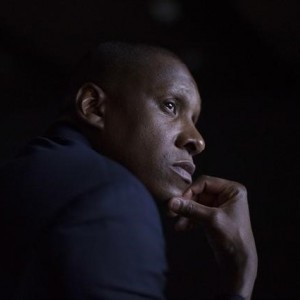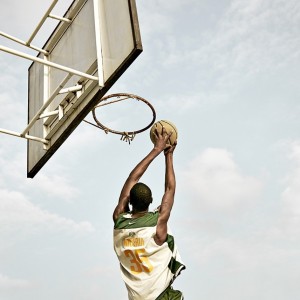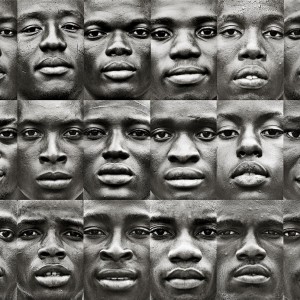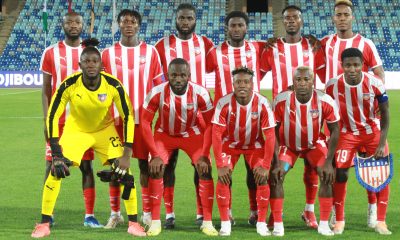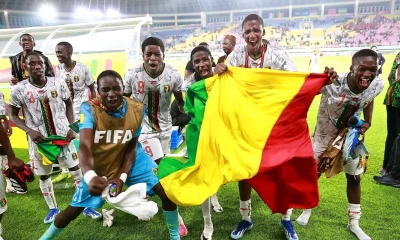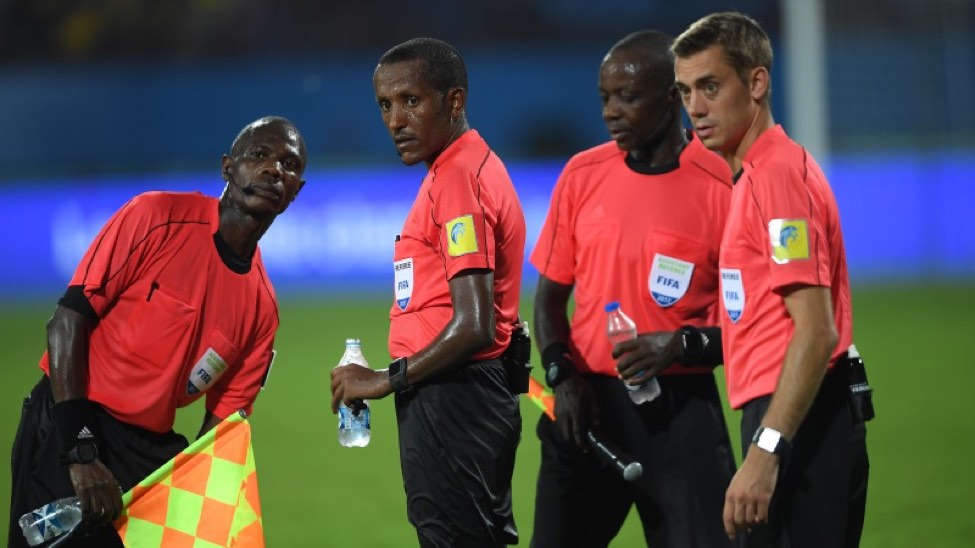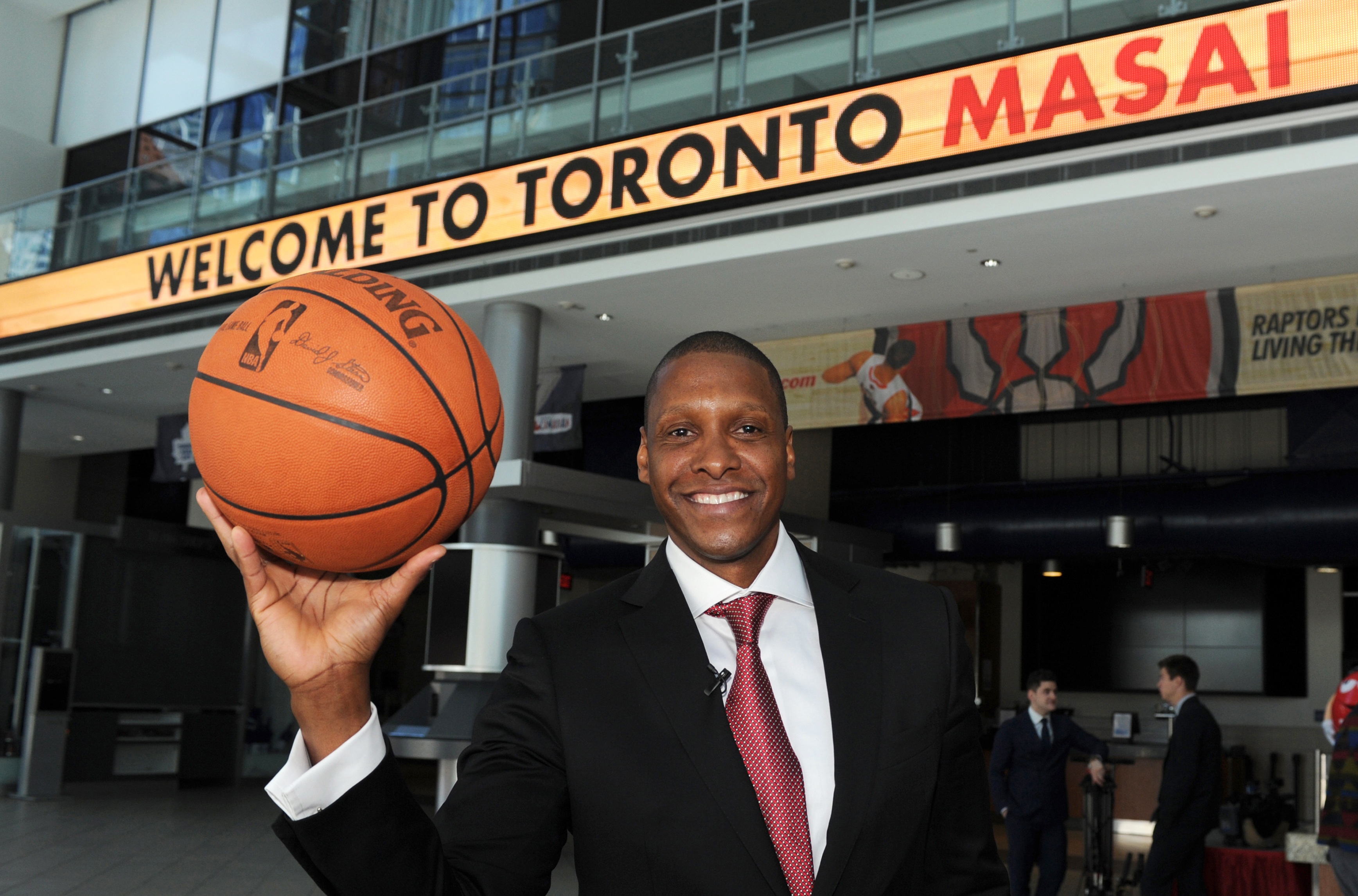
“I really do believe the reason God has put me in the place I am is to tell this story and to give an opportunity to these kids in Africa.” – Masai Ujiri
Our Familiar Story
I remember the first time I was introduced to the game of basketball. Somehow, the game had found me in a small suburb in Kampala, Uganda. I was about ten years old, and the NBA was running it’s “I Love This Game” campaign. Its agents visited my school and brought us t-shirts, magazines and a coach to show us how to play.
It was the most captivating and moving experiences to watch. From the sorcery of the crossover to the grace of the spin move. They call it poetry in motion, but to me, it was a little more than that, it was a dance, an art form and a celebration of spirit.
Me and my friends got hooked. And once we were hooked, we were hooked for life. We started to play for fun. But only some of us graduated to playing competitively. Unluckily for me, my height and limited athleticism would relegate me to playing pick-up and watching from the sidelines. I didn’t mind, though. I was still in love.
For years, I watched hysterically as my school teams played some of the most amazing basketball I’ve ever seen. There were Oohh’s & Aahh’s at every tournament as people in the crowds wondered, how these young athletes defied gravity or maneuvered skillfully against each other.
However, as we got older, things progressed to a tragic curve as I started to watch how quickly talents faded into the Kampala sunset due to the lack of opportunity.
For African basketball lovers who grew up in my era, this is a familiar story. However, for today’s generation of African players, one man may have the answer to how to make it to basketball’s finest stage.
He is, Masai Ujiri.
Masai Ujiri (Photo Courtesy: The Canadian Press/Chris Young)
There is Always a Way
[perfectpullquote align=”full” cite=”” link=”” color=”” class=”” size=””]”I was once a basketball player like them. I grew up in Nigeria playing basketball … there is always a way. Roads may be bumpy and [you] may have to take a longer path.” [/perfectpullquote]
– Ujiri
Ujiri was born by a Nigerian father, Micheal Ujiri and a Kenyan mother, Paula Grace. In the early 80’s, in Zaria, formerly known as Zazzau, in northern Nigeria, he discovered basketball at the age of 13.
“I stepped on a basketball court for the first time and fell in love with the game,” he once recalled.
Just like many, his interest was fueled by copies of American sports magazines. Ujiri became good, really good, soon he decided to migrate to the U.S. to join prep school in Seattle. At 6’4, Ujiri had a real chance of making it to the pro’s. He connected with another player from Nigeria, Godwin Owinje, and the two agreed to attend Bismarck State (Junior) College in North Dakota.
“For two years (1993- 95),” Buster Gilliss, the shool’s AD said, “we won a ton of games, and those two guys packed the gym. Best teams we ever had. Owinje was 6-(feet)-8, a strong inside player, and Masai I nicknamed ‘Smooth.’ He was a slasher-type, a runner, a jumper. He hit a game-winning shot in the playoff to go to nationals, but the officials ruled it came after the buzzer. We got a drawer full of letters about those two players.”
After his time at Bismark College, his colleague, Owinje signed for Georgetown, but Ujiri struggled to find a scholarship. Eventually, he signed and played for Montana State-Billings for the fall semester in 1995.
His time at Montana State was rough to say the least. “I didn’t enjoy it,” he said. “I really just wanted to play pro basketball. I had a British passport, and I got an agent and went to France to play on that passport (because of European teams’ limits on U.S. players).
“After two weeks I joined Derby (in the British Basketball League). I wasn’t good enough yet. But I played over there for six years (in Belgium and for BBL teams in Watford and Solent).
“I made some money, learned a lot about basketball and introduced myself to everyone.”
By everyone, he meant scouts and team officials from the NBA.
Dream a New Dream
“I am the prime example, and I use my life to show that even when your dream is to play basketball at the highest level in the NBA, you can still amount to something even if that changes.” – Ujiri
In 2002, after six years playing in Europe, it became clear that Ujiri’s career as a player wasn’t headed where he had hoped.
“I wasn’t good enough to continue a pro-career in terms of making money,” he shared. “I saw that it wasn’t going anywhere.”
He had reached the end of the road in regards to his playing career. For many, that realization can be destructive. The upset can amount to that hole that sinks their ship and sends them spiraling downward. For Ujiri, it was a challenge to find another way to impact by becoming a scout, a coach or an executive. The question was, how? Where does a young man from Africa even start?
“When my playing career ended, I got out my black book and starting making calls,” Ujiri said.
Previously, in 2000, by chance encounter and perharps one of the most important introductory moments in African sports history, Ujiri met with a reputable scout and trainer, David Thorpe at a summer league game in Boston.
“This guy with a British accent and ‘Kid ‘n Play’ fade came up to me and introduced himself,” Thorpe shared with ESPN. “That was Masai. He said he was Nigerian. He said he was here with some Nigerian friends and took me to introduce them, and he said that Olumide had told him how much help I had been to [Oyedeji], and Masai and his friends just wanted to say thanks. It was a very nice gesture. I gave him my e-mail address and never thought about it again.”
About one year and a half years after their conversation, Ujiri reached out to his “black book” and emailed Thorpe about exploring basketball opportunities in the USA.
“It sounded like he had a good feel for where the good international players were playing. From Africa, and all over Europe. He knew all kinds of players, it seemed, who could help U.S. high school or college programs. I wasn’t even thinking about the pros at that point.
“I told him it was a few weeks until the Final Four in Atlanta. I wasn’t sure I had room for him to stay with me, but if he could get there, I would meet him there and introduce him to everyone I could. He said it was no problem; he could stay with friends. I gave him my cell phone number, and we agreed to meet on some street corner,” Thorpe recalled.
Personality Opens Doors But Character Keeps Them Open
“Not many make the NBA. It’s really tough.” – Ujiri
When the two men met, Ujiri looked different; he had a new hair style, but his disposition hadn’t changed.
[perfectpullquote align=”full” cite=”” link=”” color=”” class=”” size=””]“He has a great charming smile that I recognized right away. We went to dinner with [Florida State coaches] Leonard Hamilton and Stan Jones. Within minutes he and Leonard Hamilton were good friends. We met all kinds of people all weekend. You know how people talk about videos spreading virally on the Internet? Masai spread virally that weekend. By the time Sunday rolled around, he had meetings set up with all kinds of coaches. People I had never met. Everyone wanted him to help them find good players at every level,”[/perfectpullquote]
Thorpe remembered.
After that summer, Ujiri said: “I started having contact with Jim Calhoun and Roy Williams, and all of a sudden, a lot of these coaches are calling me about players and I’m giving them information and telling them how good this kid is or whether he is good enough to play for them. I started placing kids in high schools. That is how we started building relationships with each other.”
Ujiri kept trending upwards after that. Later in 2002, Ujiri escorted a young Nigerian player to tryout for the Orlando Magic’s draft spot. Gary Brokaw, the Magic’s scouting director, was so impressed by Ujiri’s understanding of international players and proceeded to introducing him to coach Doc Rivers and the general manager, John Gabriel. Ujiri was quickly hired as an unpaid scout.
To avoid blowing the opportunity, Ujiri used up all his savings on scout trips and shared a room whenever he could.
“I did a lot of couch surfing. I remember getting locked out of a friend’s place in Serbia, so I slept on the pavement. Those were challenging times, but they helped get me where I am today,” Ujiri recalled.
Aiming for the Sky
“You can be the president of a basketball team.” – Ujiri
(Photo Courtesy: Adrian Armstrong/Sharp Magazine)
While working as an unpaid scout, Ujiri did not let the burden change him as a man. Instead, he studiouly absorbed the flavors of NBA universe, learning as much as he can with high hopes that one day, he will make it to the top.
After a while, Ujiri met the Denver Nuggets general manager, Kiki Vandeweghe who hired him for a salary as an international scout. Ujiri’s gifts started to shine like a light on a tall dark hill. Hence, a tug of war for Ujiri’s talents would ensue. In around 2007, he was pulled away by the Toronto Raptor’s Bryan Colangelo to work as the director of global scouting. In 2008, the Raptors promoted Ujiri to assistant general manager.
“When I hired Masai, I realized quickly he was very good at developing relationships and also exceptional at sizing up talent,” Colangelo once said in an interview with The Star. “He was also very confident in his opinions on players and people and not afraid to express an opinion either.”
Ujiri was rising, but he wasn’t satisfied. He kept reaching higher and in 2010, he was reclaimed by the Nuggets as the executive vice president in charge of basketball operations, the top job in the profession.
Within eight years of when he wrote that email to Thorpe, Ujiri had risen to become the first African and in fact foreign, general manager in the NBA.
“I see it like I’m carrying the flag of not only the continent of Africa but to say I’m the first foreigner to lead an NBA team, to me that’s an incredible opportunity,” Ujiri said. “It’s a challenging job, but wow! There’re 30 jobs like this in the world, and I have one of them. I will tell you I’m blessed and I will do my very, very best.”
According to Thorpe, one of the reasons for his meteoric rise was, “he knows everybody and has no enemies. That’s how deals get done in the NBA. He’s not out late clowning around. He’s very classy. He values character.”
However, he had some serious basketball issues to attend to as top boss in Denver. Most notable was the infamous Melo-drama saga that involved Carmelo Anthony trying to leverage his way into the New York Knicks. According to Yahoo! Sports, Ujiri orchestrated Anthony’s “trade to New York, getting valuable assets like Danilo Gallinari and Wilson Chandler in exchange for a star player destined to depart as a free agent. The return and Ujiri’s handling of an undesirable situation was universally applauded around the league.”
Furthermore, “He also shrewdly added Andre Iguodala as part of the four-team trade that landed Dwight Howard in Los Angeles. Iguodala gave Denver an elite perimeter stopper as they went on to win a franchise-best 57 games.”
In other words, Ujiri had somehow, lost a superstar in Anthony and still managed to turn a starless roster into a formidable contender in a tough Western Conference. In May 2013, Ujiri received the NBA Basketball Executive of the Year award for his masterful effort.
A few weeks after winning the award, Ujiri was rehired by the Raptors as team president and general manager. Once again, he was faced with a treacherous situation. The stakes were high and he had to make moves that would control the team’s present and future.
But Ujiri thrived again. According to NBA.com, in three seasons, Ujiri helped “helped to build a team that has won three consecutive Atlantic Division titles, advanced to the Eastern Conference Finals, posted three straight seasons with franchise-high victories, including 56 wins this past season, and compiled a 153-93 (.622) mark – the best record in the Eastern Conference in that span.”
In Sept. 2016, Ujiri was rewarded with a contract extension that would have him remain as the Raptors basketball president.
The Higher Purpose of Living for Others
“My honest goal is to try to build facilities in Africa… so kids have [the] chance that I got, to get to where I am.” – Ujiri
(Photo Courtesy: Adrian Armstrong/Sharp Magazine)
Outside of his duties as President of Raptor’s basketball, Ujiri is the camp director of the NBA’s Basketball Without Borders, a global basketball development, and community outreach program. Also, he is the founder of Giants of Africa an initiative that aims to provide a pathway for youth through sports throughout the continent.
According to Adrian Armstrong, an award-winning photographer who traveled to Africa to document Giants of Africa work, “Basketball and sport instills in these young men values like team work, hard work, and perseverance. Those are lessons that will hopefully follow them throughout their lives.”
In regards to the ability of African players, Ujiri firmly believes in the potential. He talked about Mbah a Moute (Cameroon) a BWB alumni, Serge Ibaka (Democratic Republic of Congo) and Luol Deng (Sudan) as success stories.
According to his CNN article: “From Angola and Tunisia to Senegal and South Sudan, there is so much size and athletic ability across the continent.
[perfectpullquote align=”full” cite=”” link=”” color=”” class=”” size=””]“Some tribes in Sudan and Senegal have an average height of 6-foot-6, which also happens to be the size of the average NBA player. People in Nigeria, Mali, and Congo, tend to be very big and physical. We need to build a strategy to go into these regions and cultivate the talent through infrastructure and instruction.”[/perfectpullquote]
He is right. As written earlier, talents in Africa often go to waste because of the limited infrastructure and less than perfect instruction. This is what happened to the gifted players I watched growing up. In a separate CNN article, he added: “It’s all up to us to find the talent.” And by helping to start leagues, help to coach, somewhere, a person will become enhanced.
In his CNN piece, he concluded: “America gave me the opportunity, but I truly believe Africa is going to be the next big thing. It is going to be prominent in tapping basketball talent. I really hope I’m alive to see it happen.
“This much is certain: I will die trying.”
Ujiri’s story may not have all the answers, but it shares the most important lessons. Anything is possible and with the right help, we can all live beyond the capabilities of our immediate reality.
“It’s in those children that I see myself, and there’s just that small window of opportunity when they can find themselves,” Ujiri shared.
Featured Photo: Masai Ujiri signed a five-year deal to be the Raptors’ GM this offseason. (Getty)

